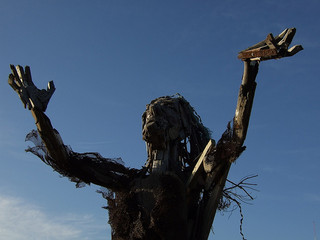
As RCIA ministers, most of us know what we do. We make Catholics. The fuzzier question is why. Why do we make Catholics?
Answers we might expect include things like having the fullness of the faith or Real Presence. Some answer by saying we were founded by Jesus while all the other churches were founded by someone else. But these answers don’t really answer why. Not very deeply anyway. Why does it matter that we are the fullest or the most real or the most authentic? Why do we do what we do?
A deeper “why”
To answer this, we have to ask why Jesus? Jesus was not the first prophet to be sent by God, nor the first miracle worker, nor even the first “son of God” (see Gen 6:2, Ex 4:22, Ps 89:26-28, 2 Sam 7:13-16). What difference did Jesus make?
Jesus offered humanity a choice—a choice between death and life. The forces of the world, both then and now, set up a false order. To keep order and peace, the world says, we need to control those who disrupt the status quo. People who do not fit into the established order are “demonized” or shut out. So when we see Jesus casting out demons in the synoptic gospels, the point is not exactly about the afflicted person or even the demon. The lesson is for those in power who have demonized this person. Jesus’s action says to them that everyone is worthy of life in the reign of God, and no one should be cast out.
Anglican priest John W. B. Hill, in “Making Disciples the Way Jesus Did,” wrote:
There is a certain irony, of course, in the notion of “casting out demons;” those who have been demonized, or written off as demon-possessed, have already been cast out! So when you are exorcized, you are “un-cast-out.” Demon possession may be a myth; but it is a myth of the Master of Myths, the Father of Lies. Demonizing is an essential feature of any society founded upon violence, to this very day.
Modern demons
Who are the people who are demonized today? We don’t expect to encounter possessed people every time we go to the mall. What we do encounter is homeless people. And mentally ill people. And addicted people. These are the people modern society has demonized.
A society that maintains peace and order by casting out those it deems disruptive is a violent, deadly society. It is a Culture of Death. The difference Jesus made is that he “un-cast-out” the outcasts.
How does that core mission of Jesus translate into our RCIA processes? I think we have to be very careful about language that excludes. When we use “us vs. them” language in our explanations of why being Catholic matters, we are edging on establishing ourselves as an exclusive society. Contrast that with what Pope Francis said about God’s inclusiveness:
The Lord has redeemed all of us, all of us, with the Blood of Christ: all of us, not just Catholics. Everyone! “Father, the atheists?” Even the atheists. Everyone! (Homily at Domus Santae Martae, May 22, 2013)
How does the core mission of Jesus translate into our RCIA processes?
So if everyone is redeemed, why be Catholic? At our core, we are Catholic to do what Jesus does. We “un-cast-out” the outcasts. But here’s the thing. We do not reach out to the outcasts for their sakes so much as for our own. Pope Francis teaches:
God shows the poor “his first mercy.” This divine preference has consequences for the faith life of all Christians…. This is why I want a Church which is poor and for the poor. They have much to teach us. (The Joy of the Gospel, 198)
When we encounter seekers and when we form catechumens and candidates, it is important to tell them how to be Catholic. But more important is to convert them to the “why” of being Catholic. Everyone comes to us steeped in the Culture of Death. We suffer from it ourselves. The conversion process we engage in is to rescue the seeker from that Culture of Death and immerse him or her in the Culture of Life. This is a life-long conversion process, and it is the very heart of why we do what we do as RCIA ministers.
What do you think?
When seekers ask you why you are Catholic, what do you say?







